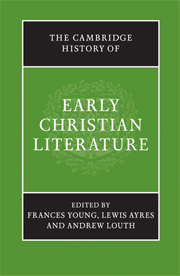Book contents
- Frontmatter
- PART ONE The Beginnings: The New Testament to Irenaeus
- A LITERARY GUIDE
- 1 Introduction: the literary culture of the earliest christianity
- 2 The apostolic and sub-apostolic writings: the New Testament and the Apostolic Fathers
- 3 Gnostic literature
- 4 Apocryphal writings and Acts of the martyrs
- 5 The Apologists
- 6 Irenaeus of Lyon
- B CONTEXT AND INTERPRETATION
- PART TWO THE THIRD CENTURY
- PART THREE FOUNDATION OF A NEW CULTURE: FROM DIOCLETIAN TO CYRIL
- Bibliographies
- Index
- Map: The Roman Empire in the late fourth century AD"
- References
5 - The Apologists
from A - LITERARY GUIDE
Published online by Cambridge University Press: 28 March 2008
- Frontmatter
- PART ONE The Beginnings: The New Testament to Irenaeus
- A LITERARY GUIDE
- 1 Introduction: the literary culture of the earliest christianity
- 2 The apostolic and sub-apostolic writings: the New Testament and the Apostolic Fathers
- 3 Gnostic literature
- 4 Apocryphal writings and Acts of the martyrs
- 5 The Apologists
- 6 Irenaeus of Lyon
- B CONTEXT AND INTERPRETATION
- PART TWO THE THIRD CENTURY
- PART THREE FOUNDATION OF A NEW CULTURE: FROM DIOCLETIAN TO CYRIL
- Bibliographies
- Index
- Map: The Roman Empire in the late fourth century AD"
- References
Summary
The term ‘Apologists’, as applied to Christian writers of the early period, denotes a series of authors who in the course of the second century composed and circulated addresses and pleas (cf. Justin, I Apol. 1.1: πρoσφώνησiν καì εντεuξiν) to emperors and others in public authority on behalf of their fellow Christians. The aim of such writings was in general to persuade the authorities that the frequent local persecutions of Christians were unjust, unnecessary, and unworthy of enlightened rulers. This aim entailed some explication of Christian beliefs, practices and morals, and of course the explication tended to grow imperceptibly into defence, the content of which might range from reassurance (e.g., that Christians did not practice cannibalism, or that they had not joined forces, whether in principle or in practice, with rebels against the Roman order) to argument (e.g., that Christianity was, despite impressions to the contrary, neither novel nor irrational by the standards of current philosophical religion). Apology in this narrow sense might of course pass over into direct refutation of critics of Christianity or attempts to establish the superiority of Christian faith to the polytheism and idolatry that characterized popular religious practice in the Roman Empire.
- Type
- Chapter
- Information
- The Cambridge History of Early Christian Literature , pp. 36 - 44Publisher: Cambridge University PressPrint publication year: 2004
References
- 13
- Cited by

